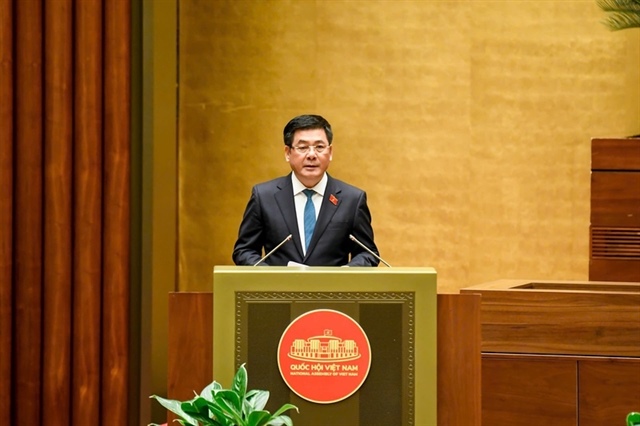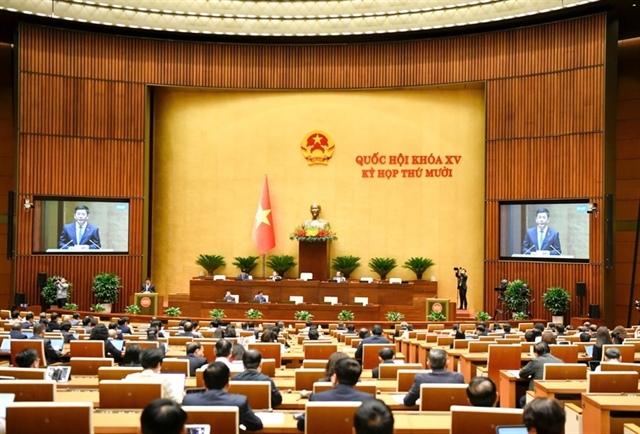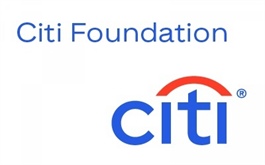E-commerce platforms and social networks face stricter responsibilities under draft law
E-commerce platforms and social networks face stricter responsibilities under draft law
The government has submitted a draft law on e-commerce to require identity verification of livestream sellers and affiliate marketers through the national digital ID system, aimed to enhance transparency and protect consumers.

Minister of Industry and Trade Nguyen Hong Dien delivers a report to the National Assembly on a draft Law on E-commerce. Photo: National Assembly |
In a report to the National Assembly on November 3, Minister of Industry and Trade Nguyen Hong Dien said that the move seeks to institutionalise the Party’s new orientations on e-commerce and the digital economy, align with Vietnam’s international commitments, and address existing legal shortcomings. It is also designed to foster rapid and sustainable e-commerce growth, safeguard domestic production and consumer rights, and contribute positively to national socioeconomic development in the digital era.
According to the Ministry of Industry and Trade’s report, e-commerce in Vietnam has been expanding strongly, accounting for around 10 per cent of total retail and consumer service revenue in 2024. However, the sector still lacks a dedicated legal framework. Existing regulations have revealed various limitations, particularly in managing sellers, collecting taxes, combating counterfeit goods, and protecting personal data.
The draft law comprises seven chapters and 48 articles, introducing new provisions that mandate the identification of domestic sellers through VNeID and foreign sellers via legal documentation. It also defines responsibilities related to information transparency, transaction traceability, violation handling, and consumer protection.
It also expands the responsibilities of social networks that engage in e-commerce and integrated digital service platforms, along with provisions to prevent abuse of market dominance and ensure fair competition.
Under the proposal, domestic sellers will be required to undergo identity verification via VNeID, while foreign sellers must provide valid legal documentation. Livestream sellers and affiliate marketers will be subject to specific requirements on identification, information transparency, and consumer protection.
For foreign e-commerce platforms operating in Vietnam, the draft mandates the establishment of, or authorisation for, a legally competent entity within the country to handle tax obligations, dispute resolution, and consumer protection issues.
Reviewing the draft, Phan Van Mai, Chairman of the National Assembly’s Economic and Financial Committee, said the necessity of developing a stronger legal framework for e-commerce.
|
He recommended that the government further clarify the classification of e-commerce as a conditional business line and make corresponding revisions to the amended Law on Investment. The committee also called for a clearer distinction between pre-check and post-check conditions to ensure effective management.
Regarding platform operators, the committee proposed refining responsibilities to ensure they are reasonable, feasible, and tailored to the nature of each platform and its level of involvement in online contract transactions.
For social networks conducting e-commerce activities, the committee suggested defining their scope of responsibility based on specific functions such as online ordering, livestream sales tied to order placement, or payment and logistics support, to create proportionate regulatory obligations.
It also urged clearer delineation between livestream and affiliate marketing activities regulated under the draft law and those covered by other legislation, including the Law on Cyber Information Security, the Law on Cybersecurity, the Law on Advertising, and the Law on Consumer Rights Protection.
Finally, for e-commerce support service providers, the committee recommended clearer rules on their responsibilities and operating conditions, ensuring consistency with laws governing electronic transactions, postal services, payment systems, and banking, while maintaining practical and enforceable obligations.
- 10:44 04/11/2025




























